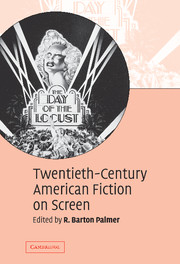Book contents
- Frontmatter
- Contents
- List of illustrations
- Notes on contributors
- Acknowledgments
- Introduction
- 1 Filming an unfinished novel: The Last Tycoon
- 2 The texts behind The Killers
- 3 The Day of the Locust: 1939 and 1975
- 4 Ship of Fools: from novel to film
- 5 Intruder in the Dust and the southern community
- 6 Dramatizing The Member of the Wedding
- 7 Film and narration: two versions of Lolita
- 8 World War II through the lens of Vietnam: adapting Slaughterhouse-Five to film
- 9 John Huston's Wise Blood
- 10 Genre and authorship in David Cronenberg's Naked Lunch
- 11 Screening Raymond Carver: Robert Altman's Short Cuts
- 12 The Color Purple: translating the African-American novel for Hollywood
- 13 The specter of history: filming memory in Beloved
- 14 Filming the spiritual landscape of James Jones's The Thin Red Line
- Filmography
- Index
- References
3 - The Day of the Locust: 1939 and 1975
Published online by Cambridge University Press: 12 January 2010
- Frontmatter
- Contents
- List of illustrations
- Notes on contributors
- Acknowledgments
- Introduction
- 1 Filming an unfinished novel: The Last Tycoon
- 2 The texts behind The Killers
- 3 The Day of the Locust: 1939 and 1975
- 4 Ship of Fools: from novel to film
- 5 Intruder in the Dust and the southern community
- 6 Dramatizing The Member of the Wedding
- 7 Film and narration: two versions of Lolita
- 8 World War II through the lens of Vietnam: adapting Slaughterhouse-Five to film
- 9 John Huston's Wise Blood
- 10 Genre and authorship in David Cronenberg's Naked Lunch
- 11 Screening Raymond Carver: Robert Altman's Short Cuts
- 12 The Color Purple: translating the African-American novel for Hollywood
- 13 The specter of history: filming memory in Beloved
- 14 Filming the spiritual landscape of James Jones's The Thin Red Line
- Filmography
- Index
- References
Summary
When Nathanael West (1903–1940) completed the manuscript of The Day of the Locust in 1938, he would not have envisioned the novel being adapted into a Hollywood film. Indeed, he consciously maintained a great distance between his screenwriting for Republic and RKO and his Hollywood novel, which focused on disaffected outsiders and drifters. The novel was explicitly an opportunity for him to create the kind of art and express the kind of vision that he could not within the confines of studio employment. As Claude Estee says of one of Tod's cynical observations about love in the novel, “It's good, but it's not for pictures.”
The Production Code was one reason that The Day of the Locust was not suitable for adaptation. Consider its romantic plot, in which an attractive ingénue is desired by three men (a studio artist, a cowboy extra, and an emotionally damaged early retiree), flirts with all of them and then sleeps with an indigent Mexican after a drunken party featuring cockfights. Consider as well her friendship with prostitutes and her selling her body to pay for her father's funeral. The stag film at the bordello, the main character's rape fantasies, the disturbing ending with an assault on a child and a riot at a Hollywood premiere: virtually all the key features of the story would likely run afoul of the Production Code standards.
But these problems are merely symptomatic of a larger, ideological difficulty.
- Type
- Chapter
- Information
- Twentieth-Century American Fiction on Screen , pp. 47 - 67Publisher: Cambridge University PressPrint publication year: 2007



